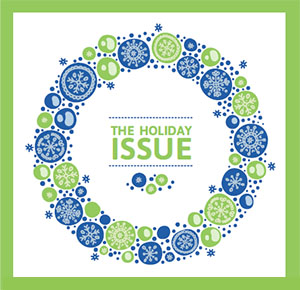
I distinctly remember feeling fat wearing the leotard pictured to the left. Yes, at the young age of four, I already heard Ed screaming, “You aren’t good enough.” If you hear Ed’s voice, you know that he can talk incessantly all year round. You also know that his chatter can get even louder around the holidays. Remember: just because he may get noisier doesn’t mean that you have to waiver in your recovery. In the end, it doesn’t matter what Ed says or does. What matters is how you respond to him. I wrote this blog post to provide you with some positive, pro-recovery options for responding to Ed this holiday season.
Thanks to everyone on my Facebook page who shared their words of wisdom related to this post. Stay tuned on Facebook and Twitter for more holiday help throughout this month. In a couple of days, on Wednesday, December 3rd, at 8 PM CST, please join me for a free MentorCONNECT teleconference, Tips to Keep Anxiety and Eating Issues from Stealing Your Holiday Joy. You will be able to call in live with questions. I hope to hear from you.
Ten Tips to Take the Holidays Back from Ed
1. Choose a Go-To Support Person. For each holiday celebration, select a designated person for support and accountability. Choose someone who is willing, available, and, if possible, actually attending the event. Teach this person the do’s and don’ts of support and discuss things-that-might-happen scenarios—explaining what kind of response would be most helpful to you in each situation.
2. Carry Support with You. Program other key support people into your phone—set them up as easy-to-access favorite contacts. In moments of distress, make a call. For extra long events, be sure to bring your cell phone charger! The Tenth Anniversary Edition of Life Without Ed suggests,
If picking up the phone to make a support call is sometimes too difficult for you, maybe you can at least send a short text—like ‘SOS’ or even ‘Ed.’ Tell your support team ahead of time what your distress signal text might say, and let them know helpful ways to respond.

3. Stop and Breathe. Practice mindfulness by paying attention to all five senses—see, hear, smell, taste, and touch the joys of the season. Meditate—even for just a few minutes—before attending holiday gatherings.
4. Facing the Food. Ed will try to make food a big deal; don’t let him. The truth is that holiday food is often the same, so you can easily plan ahead by consulting with your dietitian or a trusted support person. If you don’t know what is going to be served, consider asking beforehand. At the meal, you might even ask a support person to prepare a plate for you. For extra accountability, text a photo of your plate—before and after eating—to someone on your support team. Ask your friends and family not to comment about what you are eating.
5. Plan Something Special Beyond the Food. For many people, including those without eating disorders, food can become the focus of holiday gatherings. While it is normal and healthy to enjoy the festive meals, it can also be important to plan something to look forward to that doesn’t include turkey or stuffing. As I wrote about in Goodbye Ed, Hello Me, add fun to your schedule. Play a board game, watch a movie, or go on a walk.
6. Increase Support. The busyness of the holidays might lead you to want to cancel some therapy sessions. But the added pressure actually means that you need to beef up your support. Add to; don’t take away. Get creative. Adding support doesn’t necessarily mean a big time commitment. For instance, you can listen to recovery podcasts when driving to and from holiday events. (Click here to RSVP for Wednesday’s MentorCONNECT special holiday teleconference!) Use apps like Recovery Record to send yourself positive affirmations during holiday gatherings.
7. Address Body Image Upfront. When I was in early recovery from my eating disorder, I asked my friends and family not to make comments about my appearance. I clarified, “Please don’t even say that I look ‘great’ or ‘healthy.'” In an effort to educate your friends and family about how you experience negative body image, consider showing them the ambiguous thin or large woman pictured below from my latest book, Almost Anorexic.

8. Celebrate Small Victories. If you conquer a food fear at a holiday gathering, share the news with your support team. To some friends and family, eating a slice of apple pie might not seem like a big deal, but, to you, it surely can be a sign of courage. Celebrate with people who understand.
9. Create an Emergency 911 Card. As described in Life Without Ed, make a list of time-tested relapse prevention tips. Keep this list with you at all times. Consider typing your emergency 911 card into your smart phone as a note. Ed thrives on forgetfulness. Be a step ahead of him.
10. Remember the Meaning. Despite what Ed may tell you, the holidays were not created as a way to upset people in recovery. What does each holiday truly mean to you? Practice gratitude. Laugh.
Never, never, never give up. If you fall down this holiday season, pick yourself back up right away. Choose recovery in each and every moment. Most importantly, hold onto the hope for a full recovery. In the years to come, imagine a holiday without Ed even making a peep. Yes, it can get that good.
Check out the links below for additional holiday help with eating disorders, PTSD, addiction, as well as depression:

Making Connections: The Holiday Issue by the National Eating Disorders Association
Eating Disorder Hope Twitter Chat with me on Monday, December 15th, at 5 PM CST
Seasonal Depression: Fall-ing into Winter by The Center for Eating Disorders at Sheppard Pratt
Articles to Help you have a Safe, Happy and Sober Holiday Season by the Hazelden Betty Ford Foundation
Articles I Have Written – Scroll Down to “Help for the Holidays”
Below, feel free to post questions as well as additional holiday wisdom. I will respond to each and every comment on the blog!








